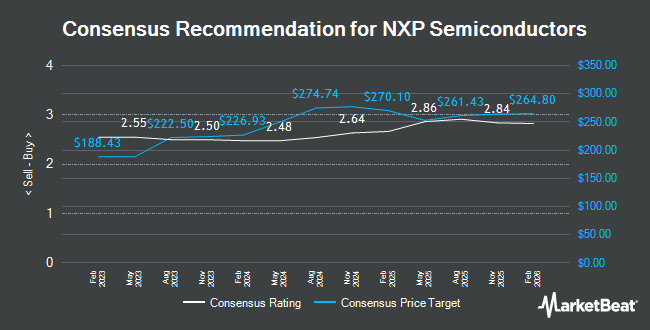The Goldman Sachs Group upgraded shares of NXP Semiconductors (NASDAQ:NXPI - Free Report) from a neutral rating to a buy rating in a report issued on Friday, Marketbeat Ratings reports. The firm currently has $257.00 price target on the semiconductor provider's stock, down from their previous price target of $260.00.
Several other equities research analysts have also commented on the company. Cantor Fitzgerald reiterated an "overweight" rating and set a $270.00 price objective on shares of NXP Semiconductors in a research note on Monday, November 4th. Morgan Stanley dropped their price target on NXP Semiconductors from $250.00 to $235.00 and set an "equal weight" rating for the company in a research report on Wednesday, November 6th. TD Cowen decreased their price objective on NXP Semiconductors from $300.00 to $285.00 and set a "buy" rating on the stock in a report on Friday, November 8th. Stifel Nicolaus dropped their target price on shares of NXP Semiconductors from $275.00 to $260.00 and set a "hold" rating for the company in a report on Thursday, October 17th. Finally, Citic Securities initiated coverage on shares of NXP Semiconductors in a research report on Friday, October 11th. They issued a $288.00 target price for the company. One research analyst has rated the stock with a sell rating, four have issued a hold rating and sixteen have assigned a buy rating to the stock. According to data from MarketBeat.com, the stock currently has a consensus rating of "Moderate Buy" and a consensus price target of $273.19.
Read Our Latest Research Report on NXPI
NXP Semiconductors Price Performance
NXP Semiconductors stock traded down $2.97 during trading on Friday, reaching $206.75. The company had a trading volume of 2,510,239 shares, compared to its average volume of 2,138,356. The firm has a market capitalization of $52.55 billion, a PE ratio of 19.73, a price-to-earnings-growth ratio of 4.37 and a beta of 1.47. The firm's 50-day simple moving average is $219.62 and its 200 day simple moving average is $238.34. The company has a debt-to-equity ratio of 0.99, a quick ratio of 1.60 and a current ratio of 2.35. NXP Semiconductors has a 1-year low of $201.58 and a 1-year high of $296.08.
NXP Semiconductors (NASDAQ:NXPI - Get Free Report) last announced its earnings results on Monday, November 4th. The semiconductor provider reported $3.45 earnings per share (EPS) for the quarter, beating the consensus estimate of $3.43 by $0.02. The business had revenue of $3.25 billion for the quarter, compared to analyst estimates of $3.25 billion. NXP Semiconductors had a net margin of 20.98% and a return on equity of 33.57%. The company's revenue for the quarter was down 5.4% compared to the same quarter last year. During the same quarter last year, the business earned $3.31 earnings per share. As a group, equities research analysts anticipate that NXP Semiconductors will post 11.33 earnings per share for the current fiscal year.
NXP Semiconductors Dividend Announcement
The business also recently disclosed a quarterly dividend, which was paid on Wednesday, January 8th. Investors of record on Thursday, December 5th were issued a $1.014 dividend. The ex-dividend date was Thursday, December 5th. This represents a $4.06 annualized dividend and a yield of 1.96%. NXP Semiconductors's dividend payout ratio (DPR) is currently 38.65%.
Institutional Investors Weigh In On NXP Semiconductors
Institutional investors have recently made changes to their positions in the stock. ORG Wealth Partners LLC boosted its position in shares of NXP Semiconductors by 915.4% during the 4th quarter. ORG Wealth Partners LLC now owns 132 shares of the semiconductor provider's stock worth $27,000 after purchasing an additional 119 shares during the period. FSA Wealth Management LLC acquired a new position in NXP Semiconductors during the third quarter worth $33,000. Fortitude Family Office LLC boosted its position in shares of NXP Semiconductors by 52.4% during the fourth quarter. Fortitude Family Office LLC now owns 218 shares of the semiconductor provider's stock worth $45,000 after buying an additional 75 shares during the period. Valley Wealth Managers Inc. acquired a new stake in shares of NXP Semiconductors in the second quarter valued at $48,000. Finally, Avior Wealth Management LLC raised its holdings in shares of NXP Semiconductors by 182.1% in the 3rd quarter. Avior Wealth Management LLC now owns 220 shares of the semiconductor provider's stock valued at $53,000 after buying an additional 142 shares during the period. 90.54% of the stock is currently owned by institutional investors and hedge funds.
NXP Semiconductors Company Profile
(
Get Free Report)
NXP Semiconductors N.V. offers various semiconductor products. The company's product portfolio includes microcontrollers; application processors, including i.MX application processors, and i.MX 8 and 9 family of applications processors; communication processors; wireless connectivity solutions, such as near field communications, ultra-wideband, Bluetooth low-energy, Zigbee, and Wi-Fi and Wi-Fi/Bluetooth integrated SoCs; analog and interface devices; radio frequency power amplifiers; and security controllers, as well as semiconductor-based environmental and inertial sensors, including pressure, inertial, magnetic, and gyroscopic sensors.
Featured Articles

Before you consider NXP Semiconductors, you'll want to hear this.
MarketBeat keeps track of Wall Street's top-rated and best performing research analysts and the stocks they recommend to their clients on a daily basis. MarketBeat has identified the five stocks that top analysts are quietly whispering to their clients to buy now before the broader market catches on... and NXP Semiconductors wasn't on the list.
While NXP Semiconductors currently has a "Moderate Buy" rating among analysts, top-rated analysts believe these five stocks are better buys.
View The Five Stocks Here
Almost everyone loves strong dividend-paying stocks, but high yields can signal danger. Discover 20 high-yield dividend stocks paying an unsustainably large percentage of their earnings. Enter your email to get this report and avoid a high-yield dividend trap.
Get This Free Report
Like this article? Share it with a colleague.
Link copied to clipboard.